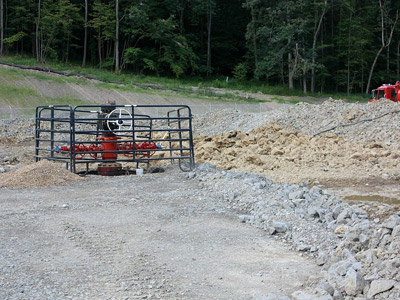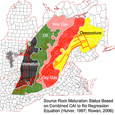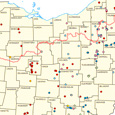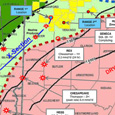Pennsylvania DEP issues revised drilling rules
Wednesday, January 13, 2016

SALEM, Ohio — The Pennsylvania Department of Environmental Protection announced some new regulations in the oil and gas industry to protect the public’s health, safety and the environment.
The DEP sent the standards (Chapter 78 and 78a) to the state Environmental Quality Board for review Jan. 6. The board will review the standards, and when it approves them, continues the approval process, they could be effective by early summer. The rules will impact both the conventional and unconventional oil and gas industries. The rules referred to as Chapter 78 are for conventional wells; the rules referred to as the Chapter 78a are designated for unconventional or shale wells. The amendments to the oil and gas regulations will impact five areas, including water resources; adding public resource considerations; protecting the public’s health and safety; addressing landowner concerns; and improving data management.
Public resources
Well drillers will have to address potential impacts to public resources during the well permitting process. The permit applicant will have to identify the potentially impacted public resources and notify the public resources agency. For example, if a well site is within 200 feet of a publicly owned park, forest game land or wildlife area, the application would have to contact the Department of Conservation and Natural Resources or the Pennsylvania Game Commission.
Other locations where the notification kicks in are: if the well is in or within the corridor of a state or national scenic river; within 200 feet of a national natural landmark; within 200 feet of a historical or archaeological site listed on the federal or state list of historic places; or within 200 feet of a common area on a school’s property or playground. If the well is within 1,000 feet of a water well, surface water intake, reservoir or other water supply extraction point used by a water purveyor (unconventional wells only), then notifications have to be made as well.
Abandoned wells
Another area that has changed is in connection with orphan or abandoned wells in Pennsylvania. Well operators must identify active and inactive wells within 1,000 feet of the vertical and horizontal wellbore prior to hydraulic fracturing.
The identification process requires operators to review the department’s orphan and abandoned well database, review farm line maps, and submit a questionnaire to landowners whose property lies within the area of review prior to drilling in cases where hydraulic fracturing activities are anticipated at the well site. Other databases and historical sources must also be consulted.
Containment practices
The DEP realized that the biggest source of pollution by the oil and gas industry has been the release of regulated substances onto the ground.
Under the new regulations, drillers will need to have secondary containment systems for all chemicals and substances used except fuel in equipment or vehicles. Operators will now also be required to inspect the secondary containment weekly.
Protecting water
The revised regulations will ban the use of temporary waste storage pits at unconventional (shale wells). It also will require pipeline construction companies to develop preparedness, prevention, and contingency plans when performing horizontal directional drilling under a waterway to minimize impacts on waters in the event of an inadvertent return.
Operators will be required to restore a well site, including filling pits and removing drilling supplies and equipment within nine months of completion of drilling.
Reporting
Drillers will now have to be required to do more reporting directly to the DEP. The reports will include the waste from the drilling pad, fracking reports, cementing and drilling reports monthly. Pennsylvania Gov. Tom Wolf said the regulations proposed are right for the state. He said Pennsylvania is No. 2 in the country for natural gas production, and he wants to keep it that way, but the state must also protect the people and natural resources.
“These will result in superior protection of the land,” said Wolf.
DEP Secretary John Quigley said the rules were developed with the help of the public and is not an end point, but a chance to make sure drilling is safe in Pennsylvania. He said he feels the updated regulations are a balance between the industry and safety. However, it appears the Pennsylvania Independent Oil and Gas Association may not feel the same way.
Industry not happy
Pennsylvania Independent Oil and Gas Association President Louis D. D’Amico issued a statement voicing the group’s disapproval of the regulations.
“The development of these regulations over the past four years has been flawed to the point of being fraudulent. The modernization of environmental controls was required by Act 13 for the unconventional industry and yet, despite working on these regulations since 2011, DEP has still not explained or shown the need to make them applicable to the conventional industry,” said D’Amico in the statement.
He added that the rules are not reasonable and that the rule-making process was not transparent.
“Repeated references by this administration to whatever it proposes as ‘common sense’ cannot magically transform any of them, especially these rulemakings. We look forward to pressing on with our fight against this abuse of process and extreme regulatory overreach these rulemakings represent.”
Quigley said in a news conference that a challenge by the industry is possible, but for now, the rules will be passed on to the next stage and the state will take a “wait and see” approach.




